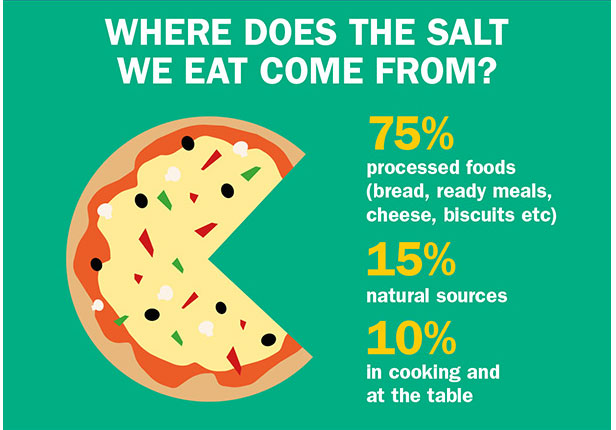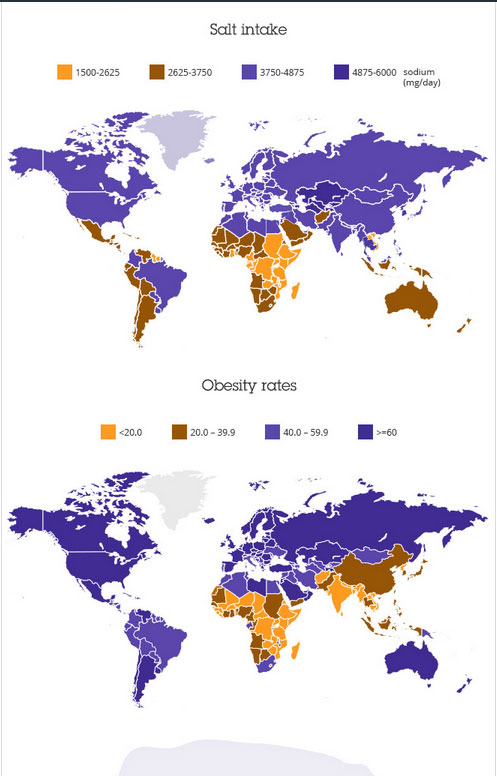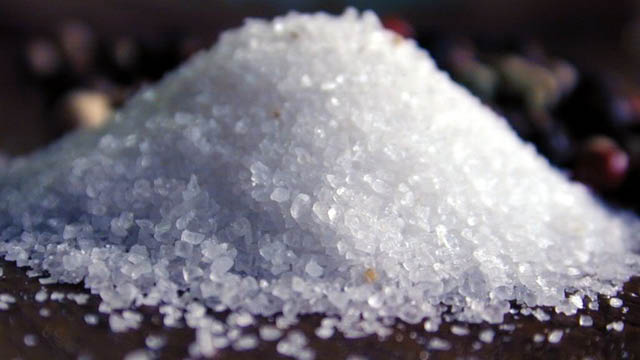Like many other countries, the UK has a strong and unhealthy relationship with salt.
Not only is it over-consumed; health experts warn it is causing serious health issues. It’s certainly no surprise that experts believe that the nation is experiencing a salt epidemic.
How Much Salt Do We Consume?
It is estimated that 90% of people eat too much salt. Processed foods are particularly to blame, as in many cases salt is added to these types of foods, to increase the taste.
The recommended level for an adult is no more than 8g per day, but in England, Scotland and Wales this is exceeded. According to the World Cancer Research Fund, sources of salt in the UK diet are from three main sources – processed foods, natural sources and added during cooking or at mealtimes.

Source: wcrf-uk.org
According to the Harvard Medical School, a lesser consumption of salt would save half a million lives over the course of a decade.
What Health Problems Does Salt Cause?
The majority of medical advice encourages us to reduce our salt intake because of the health problems it creates. This is generally down to the fact that sodium causes water retention. This retention fills blood vessels with extra fluid and in turn increases blood pressure that damages arteries. Arteries then thicken and narrow in response.
Damaged arteries lead to poor blood flow as the heart struggles to pump an increased volume of blood through narrower veins. Anyone with a reading of 140/90 has high blood pressure. Recent research has also suggested a correlation between a high salt diet and obesity.

Source: healthexpress.co.uk
High blood pressure as a result of a high salt diet can lead to:
Coronary Heart Disease
High blood pressure causes arteries to thicken, and therefore narrow the space for blood flow. It also thickens the heart muscle leading to a reduced ability to pump blood.
Stroke
High blood pressure is the biggest risk factor for stroke. When arteries narrow and thicken it increases the chance of a blood clot or a burst blood vessel.
Vascular Dementia
Vascular dementia can be caused by a lack of blood entering the brain. This can happen as a gradual build up or as a result of stroke.
Stomach cancer
A bacterium called helicobacter pylori is a big risk factor for stomach cancer. A high salt diet increases the vulnerability to helicobacter as it damages stomach lining. Salt may also increase the growth and action of helicobacter.
Obesity
Some evidence suggests that salt is directly linked to obesity. A recent study found that independently a 1g daily increase of salt correlated to a 25% increase in the risk of obesity.
Kidney Disease
A high salt intake can damage kidneys, in part due to high blood pressure increasing the strain and damaging the organs. This can mean kidneys don’t filter waste products sufficiently, and may retain calcium that creates kidney stones.
Osteoporosis
Because kidney function with high blood pressure lowered calcium levels can lead to osteoporosis where the bones become brittle and break more easily.
Ménière’s Disease
This is a rare disease that damages the ear causing giddiness, vomiting and hearing loss. A high salt diet exacerbates the symptoms because fluid retention increases pressure on the inner ear.
How To Reduce Salt Intake
- Avoid processed foods, which contain a good deal of salt, so understanding the label is key. Seek out convenience meals that are ‘sodium-free’ have ‘no added salt’
- More obvious sources of salt are bacon, cheese and salted meats or nuts, but bread is one of the biggest contributors to our salt intake. Canned vegetables also contain high salt levels. Knowing what’s in your food is crucial for reducing your salt intake.
- There are suggestions that eating more potassium can lower the effects of sodium. Bananas, potatoes, spinach and beans all contain potassium.














